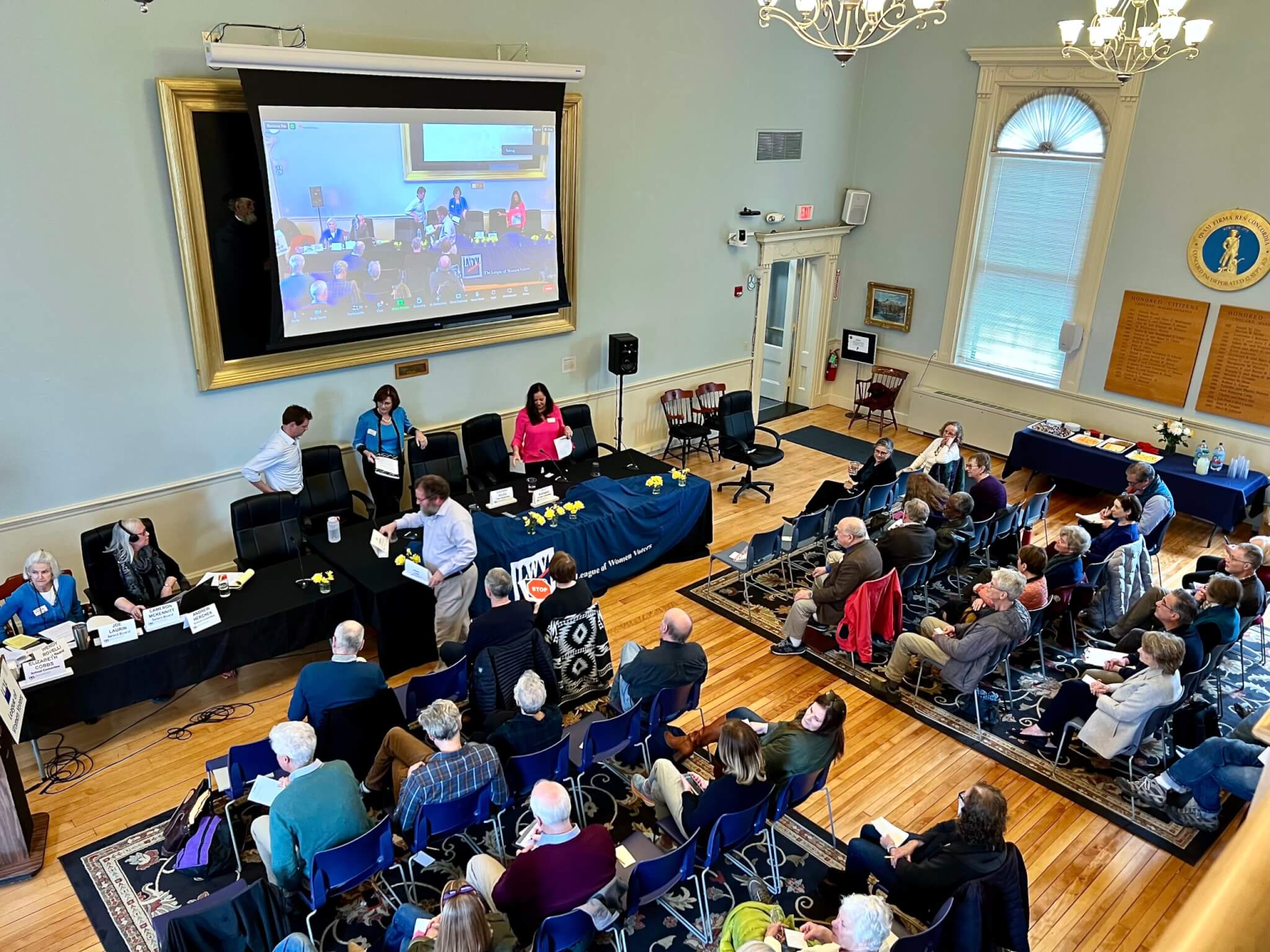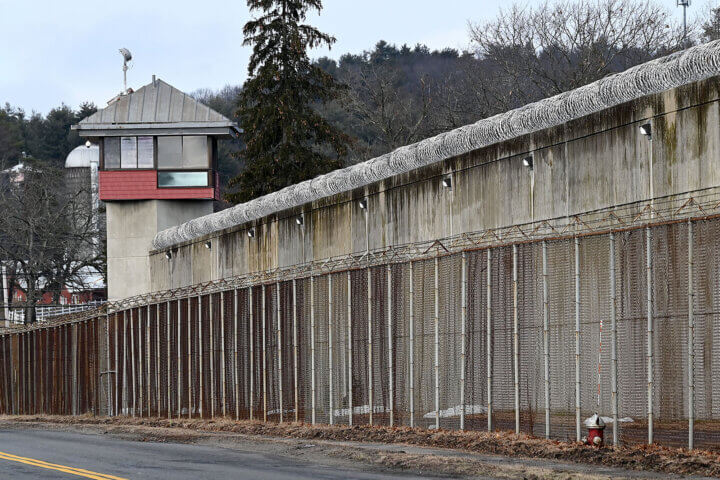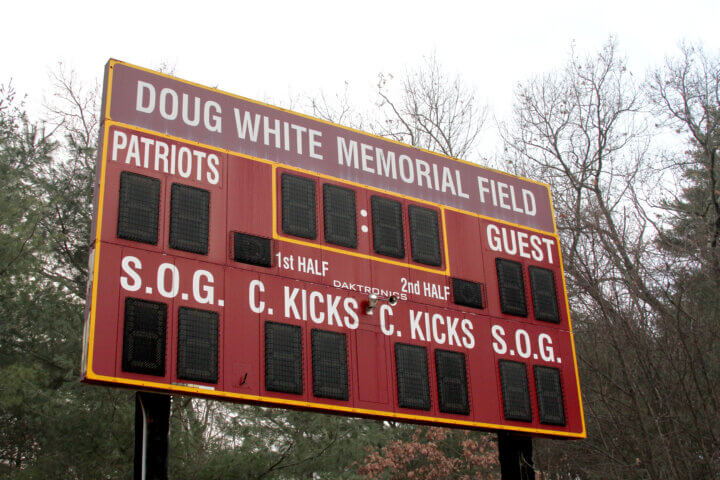By Celeste Katz Marston — Celeste@theconcordbridge.org
Yellow roses adorned the main table at the League of Women Voters of Concord-Carlisle candidate forum — a suitable pick for a session that had the town’s political hopefuls navigate a series of very thorny issues.
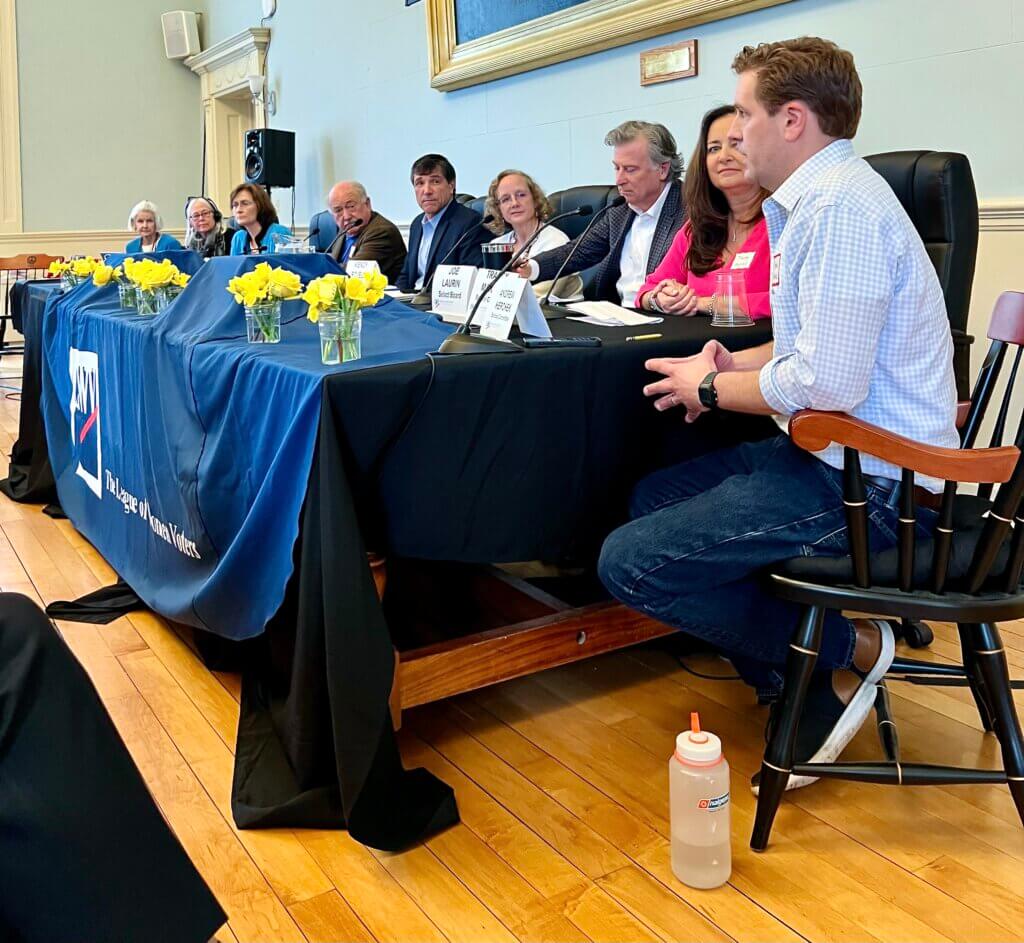
The seven Select Board and School Committee candidates made their pitches to the forum audience. Photo by Celeste Katz Marston
The wide-ranging, two-hour Sunday symposium at the Town House touched on an array of local challenges, from the newly instituted residential tax exemption to school performance, affordable housing, and even how Concordians govern themselves via Town Meeting.
This April 9, four candidates are vying for two spots on the Select Board, and three are competing for two seats on the School Committee.
The incumbent Town Moderator and a member of the Housing Authority are running unopposed.
Prison prospects
Current Select Board Chair Henry Dane, an attorney, is running for re-election. He’s joined in the race by data science company CEO Joe Laurin, National Grid executive Cameron McKennitt, and recently retired healthcare and finance executive Wendy Rovelli.
Laurin called the impending MCI-Concord closure “a gift to the town” but cautioned that Concord needs a seat at the table in state talks: “We can’t be passive about this and assume folks on the other side are going to be nice and play nice with us.”
Rovelli said the town has “housing needs, but I also believe there’s an opportunity for mixed use to bring more commercial base into the town to help offset some of our tax base.” She called the prison’s water treatment plant a priority.
McKennitt said he’d bring to bear his “almost 20 years in two heavily regulated industries, healthcare and energy” to contribute to a comprehensive approach to re-envisioning the site.
And Dane said Concord must consider the governor’s and the region’s aims while working with state officials and “do a very forceful balancing act in order to get what we need out of this piece of property.”
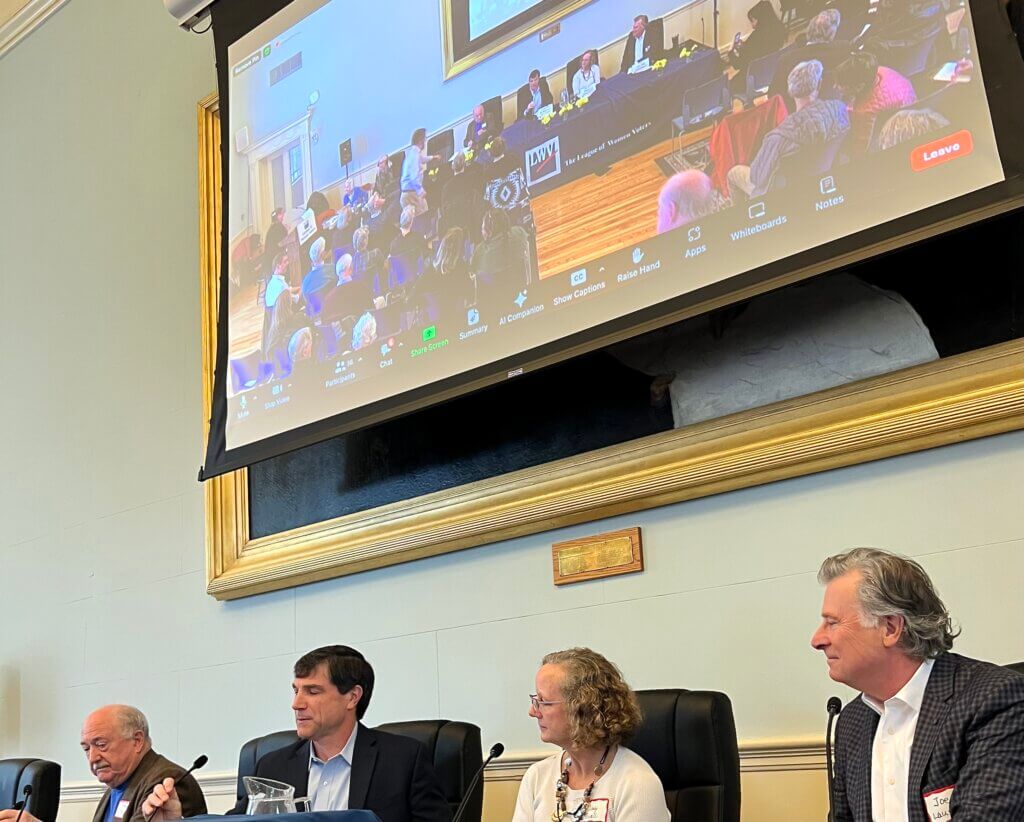
Left to right, current Select Board Chair Henry Dane and candidates Cameron McKennitt, Wendy Rovelli, and Joe Laurin address the in-person and virtual forum attendees.
Photo by Celeste Katz Marston
Tax break talk
On the new residential tax exemption, which shifts the tax burden toward the highest-assessed homes, McKennitt said towns like Lexington did deep-dive studies of the impact, but “I don’t believe we did the same diligence in Concord. I would like to see us do that.” He also said he wouldn’t increase the exemption beyond the current 10%.
Laurin said relying as heavily as Concord does on residential taxes isn’t sustainable. While it’s one thing to have goals of affordability, including so seniors can “retire here with dignity,” he said, the RTE “was a bit of a blunt instrument, and I would frankly look at additional tools that might be more precise.”
Dane, who has championed the exemption on the Select Board, agreed that it is a blunt instrument — but “the legislation that controls the ability of a town to raise taxes gives us very few [options, and] this was the only one that had any hope of being successful in terms of creating some equity among our homeowners.”
Rovelli said she supports the RTE as being financially helpful to most town residents but would like to know how many people have applied for it, among other things: “Right now, I would probably keep it at 10%. I certainly wouldn’t increase it at this point.”
The quartet also answered diversity, housing, sustainability, and Select Board transparency questions.
School (Committee) is in
Current School Committee Chair Tracey Marano, a former special education teacher and assistant principal, is looking for another term. She is joined in the contest by Personnel Board C0-Chair Liz Cobbs, a former academic and business executive, and by engineer and businessman Andrew Herchek. All three have or had children in Concord schools.
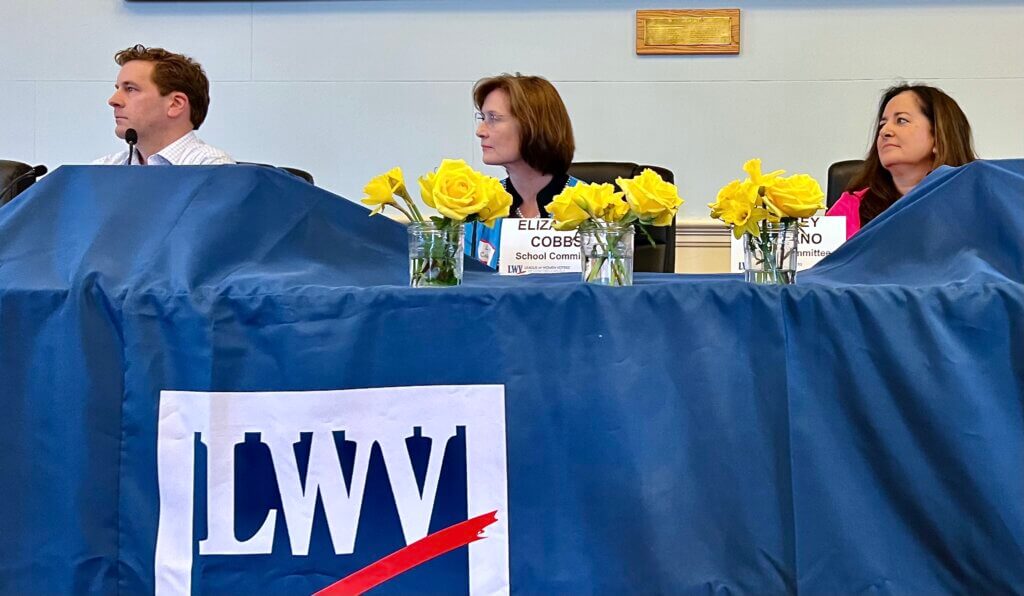
School Committee candidates Andrew Herchek, Liz Cobbs, and current Chair Tracey Marano focus on the moderator at Sunday’s LWV forum. Photo by Celeste Katz Marston
Asked at the LWV forum about top priorities for the coming school year, Herchek focused on budgeting and capital planning, Marano highlighted budgeting and the academic and general well-being of students, and Cobbs touched on mental health and special services, capital planning, and diversity.
The School Committee now hears public comments at the top of their meetings, but does not formally respond.
Marano said it’s “important to listen to all constituents” but wouldn’t change the response policy. Herchek also said he’d keep the policy in place, as there’s ample opportunity to consider public comment outside the immediate context of meetings. Cobbs said she’d like a mechanism for the committee to respond to citizens’ comments, although “perhaps not right on the spot.”
Tough choices
As to difficult decisions the School Committee has made in the past year, Cobbs said that on the controversial request to spend more than $2 million on a restroom building for the high school playing fields, she supports the issue but would have liked “a more transparent process” on the budgeting and timeframe.
The naming of the new middle school has also garnered heavy attention. The committee voted last month to go with “Concord Middle School,” despite a wave of support for naming the building after racial justice activist Ellen Garrison.
Marano said the School Committee had done “a great job” of considering the issue with the help of an open process that pulled in hundreds of emails and extensive public comment. She also said the committee continues to discuss the “amenities building” at CCHS after hearing from Concord and Carlisle’s Select Boards and Finance Committees.
Herchek said he thought the Committee “did a really good job” handling the middle school naming, fostering “a really inclusive process” with a great deal of resident feedback.
The candidates also fielded questions about the impact of students from the Elm Street emergency shelter, Advanced Placement exams, and performance benchmarks for spending and collective bargaining agreements.
Seeking further service
The LWV audience also heard from two incumbents who are running unopposed: Housing Authority member Edward Tar Larner, who’s seeking a third five-year term, and Town Moderator Carmin Reiss, who’s held the job since 2016 and is seeking another one-year term.
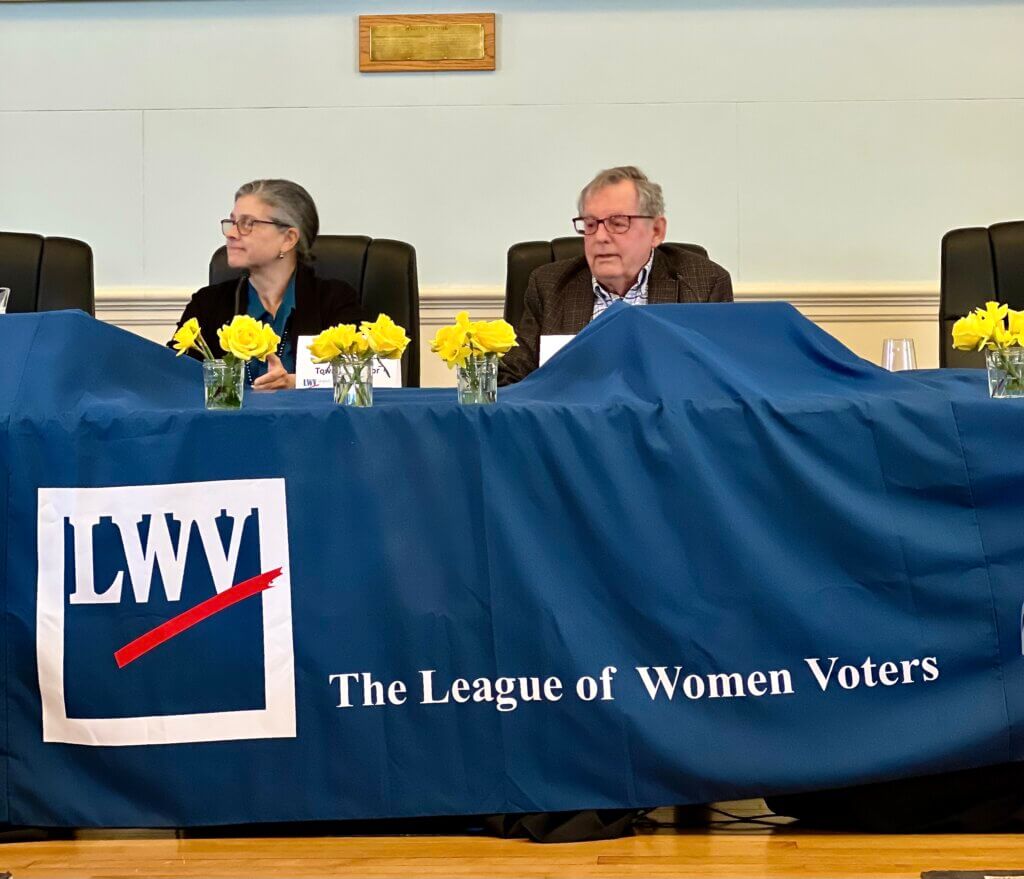
Town Moderator Carmin Reiss, left, and Housing Authority member Edward Tar Larner, both incumbents, discussed their track record and aspirations for another term.
Photo by Celeste Katz Marston
Larner said when it comes to bringing more affordable housing to Concord, “we just need consensus,” including when it comes to the impending closure of MCI-Concord as soon as this summer and the fate of that property: “I know the state reps [have been] talking about a committee to come up with a unified front, but we also have to have a unified front about where housing can go,” he said.
Additionally, “The governor’s bond bill is going to increase housing funding in many ways. The Housing Authority has been acquiring individual houses,” Larner said. “We have the MBTA Communities Act, which is going to allow for more multiple-family housing with apartments or duplexes or triplexes.”
The April 29 Town Meeting warrant carries multiple articles related to how Concord governs itself, and Reiss said as much as she embraces Town Meeting and is “delighted” to be part of it, “what’s hard is [the] difficulty that many people have in participating.”
To that end, Reiss is supporting the creation of a formal study group — for the first time since 1996 — to give the structure of Town Meeting a thorough review.
“In 30 years, lots of things have changed,” she said, “and it’s my hope that that committee will be formed [and] come up with some really good ways to make Town Meeting more inclusive [and] more effective.”
The voter registration deadline for the April 9 town election is March 29 at 5 p.m. The vote-by-mail application deadline is April 2. For information on voter registration, visit https://concordma.gov/375/Elections-Voting.


